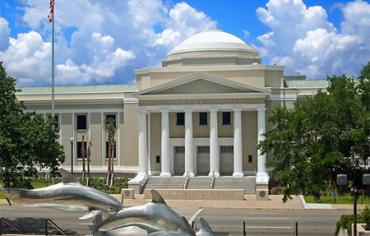By JOHN HAUGHEY THE CENTER SQUARE

Florida Supreme Court
The Florida Supreme Court will conduct its mandated review of proposed ballot language in prospective constitutional amendments seeking to impose an “assault weapons” ban and to legalize recreational marijuana on Feb. 4.
Both measures are seeking to qualify for the November 2020 ballot and are among three initiatives being challenged by Florida Attorney General Ashley Moody.
After a prospective measure garners 76,632 signatures, state law requires the Supreme Court to review the language that would appear on the ballot to ensure wording accurately conveys intent and complies with the state’s single-subject rule for citizen initiatives.
To get on the November 2020 ballot, proposed constitutional amendments must present 766,200 verified voter signatures to the state’s Division of Elections (DOE) by Feb. 1, 2020.
Ban Assault Weapons Now’s (BAWN) prospective constitutional amendment seeking to outlaw “assault weapons” had submitted 108,822 signatures to the DOE as of Tuesday.
The measure’s six-word title and five-sentence summary would widen the definition of “assault weapon” to include any semi-automatic rifle or shotgun capable of holding more than 10 rounds of ammunition, using a fixed or detachable magazine or an ammunition-feeding device.
That language is “clearly and conclusively defective,” Moody argued in a July 26 petition to the Supreme Court to block the measure from being on the ballot.
Moody said BAWN’s proposal would ask voters to outlaw the possession of virtually every semi-automatic long-barreled firearm, including shotguns and rifles, as “assault weapons.”
In her petition, Moody said “voters will not be able to understand the true meaning and ramifications of the proposed amendment, making the ballot language clearly and conclusively defective.”
Sensible Florida’s “Regulate Marijuana in a Manner Similar to Alcohol to Establish Age, Licensing, and Other Restrictions” ballot proposal would, essentially, legalize the use and possession of marijuana by adults, 21 years old and older.
As of Tuesday, Sensible Florida had submitted 91,077 signatures to the DOE.
Moody on Sept. 11 petitioned the Supreme Court to not allow Sensible Florida’s “misleading” initiative from qualifying for the ballot, noting the prospective measure’s language is longer than Article I of Florida’s Constitution and 30 Constitutional amendments combined.
“There’s no way 10 pages of the law can be summarized clearly in 75 words or less and would adequately convey to the voters what exactly they will be voting on,” Moody said, referring to the word limit for summaries voters will see on the ballot.
Sensible Florida Chairperson Michael Minardi refuted Moody’s allegation that the measure is too long.
Moody has also petitioned the Supreme Court to remove a prospective “Energy Choice” measure from the ballot. No date has been set for that hearing.
Citizens for Energy Choices’ proposal would allow individual customers to choose energy providers or produce their own. As of Tuesday, 440,937 voters had signed onto the initiative.
Moody, House and Senate leaders, the Florida Chamber of Commerce, the Florida Health Care Association and the Florida Public Service Commission [PSC] are among those seeking to stop the “energy choice” measure before it gets onto the November 2020 ballot.
Opponents filed 13 briefs in June with the Supreme Court, arguing the measure is a “Frankenstein’s Monster of policies” and a power grab by start-up companies that want to carve into a market dominated by four investor-owned utilities.
“Contrary to the image of regular citizens trying to change the way they are governed, this is a well-heeled special interest group trying to advance a policy change that would benefit their industry,” the Florida Senate said its brief. “The [Supreme] Court should be skeptical of commercial interests attempting to use the citizen initiative process to benefit themselves.”
Three other measures have qualified for the Supreme Court review and, thus far, have not drawn challenges over their wording from the state:
Minimum wage: Florida for Fair Wage’s campaign to raise the state’s minimum wage to $15 an hour by 2026 had collected 739,987 signatures as of Tuesday.
Open primaries: All Voters Vote’s proposed 2020 ballot measure would require all candidates for state legislature, governor and cabinet appear on the same primary ballot open to all registered voters. As of Tuesday, 682,197 voters had signed onto the initiative.
Citizenship Requirement to Vote: Florida Citizen Voters’ prospective measure would require the state Constitution stipulate that “only” rather than “any” U.S. citizen can vote in state elections. According to the DOE, 927,662 voters had submitted signatures as of Tuesday.
John Haughey is the Florida contributor to The Center Square.








